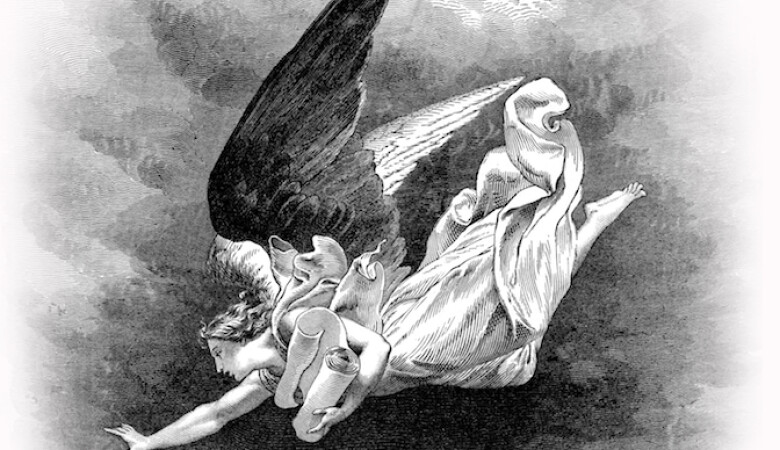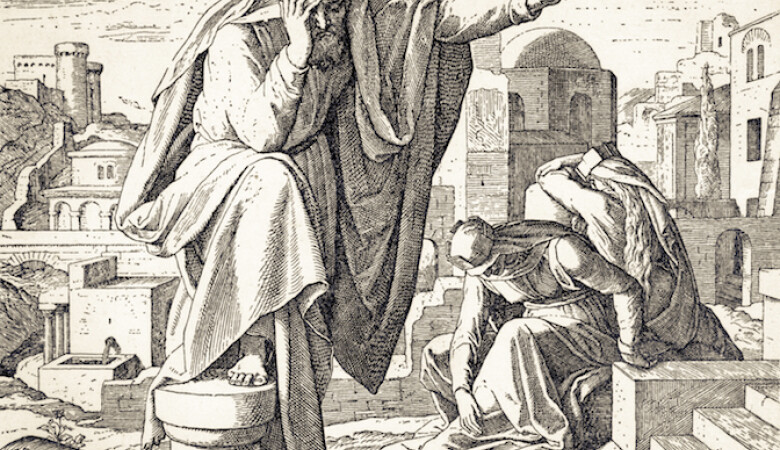How Much Heaven Do You Want? (Revelation Sermon 46 of 49)
May 06, 2018 | Andy Davis
Revelation 22:12
Heaven
sermon transcript
An Amazing Resolution by a Teenager
In the fall of 1722, a teenager named Jonathan Edwards, a religious prodigy in almost every regard, came to understand the Christian life better than almost anyone that I have studied. At age 19, he set down a challenging set of resolutions that would guide the rest of his life. This was a common practice in Puritan New England, done by ambitious and high-minded people. The practice continued into the Colonial era — George Washington and Benjamin Franklin made similar resolutions, though more worldly and pragmatic, for self-discipline and achieving success in this world, their generation’s version of Seven Habits of Highly Effective People. Edwards’ resolutions are a masterpiece of godly determination and holiness, regarding making the most of every moment that we have in this world. They are all worth studying, but we will focus on Resolution #22: “Resolved, to endeavor to obtain for myself as much happiness, in the other world, as I possibly can, with all the power, might, vigor, and vehemence, yea violence, I am capable of, or can bring myself to exert, in any way that can be thought of.”
Edwards was determined to do whatever he could in this world to maximize his happiness in the other world, that is, in Heaven. This is a revolutionary thought. How we live our lives in time will affect how we enjoy eternity. Edwards speaks of endeavoring to obtain happiness in Heaven. That speaks of deeds done, of works. Furthermore, he expects that it will take everything he has to obtain maximum joy in Heaven. He speaks of pitching in all the power, might, vigor, and vehemence he has, giving every moment of energy, totally consumed at every moment, pouring out all the power of body and soul toward this one end. Then he adds the curious word “violence” as though he expects that obtaining maximum joy in Heaven will require war on earth. As the apostle Paul said at the end of his life, in 2 Timothy 4:7, “I have fought the good fight, I have finished the race, I have kept the faith.” Edwards expected that obtaining maximum joy in heaven would be violently opposed every step of the way by those ancient foes of our soul: the world, the flesh, and the devil.
I am so grateful for the beautiful multi-generational diversity God has given us in this church — godly elderly saints and godly teens. My heart is for all of you, even at an early age, to make the most of your time on earth. I will not give up on anyone no matter how old, but I do have a special word for the youth of our church — for teenagers and college students — that you would make the most of your lives, resolving now to do this. Edwards thought this was an appropriate way of looking at life, but was he right? Was he simply an 18th century Scottish rationalist, philosopher and mystic, such that we can discard his outlook? Can we actually prove by Scripture that our works will affect our heavenly experience? I believe that we can, and I assert that Edwards’ 22nd resolution was based on a true understanding of many verses of Scripture that show that our works — as justified, forgiven saints, people of God who have crossed over from death to life, from darkness to light, who have come to faith in Christ — will affect our heavenly experience.
I want to call each one of you to maximum spiritual effort. I want to ignite within each of you a godly ambition to use your life well, a fire that will result in maximum spiritual and physical effort for the glory of God for the rest of your life. No book of the Bible so clearly depicts our life in the next world as does this incredible book of Revelation, especially the final two chapters, 21 and 22.
Christ Comes Soon With His Rewards
The Promise Asserted and in Context
Revelation 22:12 says, “Behold, I am coming soon! My reward is with me, and I will give to everyone according to what he has done.” Christ is coming soon with his rewards. He asserts a promise: “Behold, I am coming soon!” He directs our attention, as though the veil is being pulled back — behold! — referring to the Second Coming of King Jesus, when he will come in breathtaking glory to punish his enemies and reward his servants. Behold, he is coming soon.
Most of the book of Revelation depicts what terrifying dreadful things he will do to his enemies. But these last two chapters speak of what he will do for his servants. Let us put this promise in context. “Revelation” means “unveiling,” pulling back the veil so that we can see present invisible spiritual realities. Present realities include the fact that the resurrected glorified Christ is ministering among the seven golden lamp stands, which represent local churches like this one all over the world, through every era of church history; that Almighty God is sitting on His heavenly throne of glory surrounded by 24 elders on thrones, living creatures and 100 million angels; that the Lamb of God is triumphant, looking as if he had been slain, having redeemed people for God from every tribe and language and people and nation; that the devil and his angels (demons) constantly assault the people of God in this world.
The book of Revelation also speaks of future realities. Revelation 1:1 says, “The revelation of Jesus Christ, which God gave him to show his servants what must soon take place.” John details, over many chapters, the future of the progressive unfolding wrath of God, with judgments within seven seals, seven trumpets, and seven bowls; the future Second Coming of Christ; the future New Heaven and New Earth and New Jerusalem, and what that world will be like.
Now, he says, “Behold, I am coming soon! My reward is with me, and I will give to everyone according to what he has done.” He says this four times — verses 6, 7, 12, and 20 — as if we had somehow missed it, begging us to hear. Revelation 22:20: “He who testifies to these things says, 'Yes, I am coming soon.’” John immediately replies, “Amen. Come, Lord Jesus.”
The word “soon” may be perplexing to us. It has been 2000 years, but 2 Peter 3:8 says, “With the Lord a day is like a thousand years, and a thousand years are like a day.” The word “soon” is meant to make us as servants who do not see our master every day with our eyes to cause us to be perpetually vigilant in his service. But with the expectancy that at any moment he may come, it affects the way we live at every moment. We are to be continually alert, active, and aware.
The Doctrine of Christian Rewards
When he comes, he will bring his reward with him. We could use negative terms, as a warning to his enemies. I will instead zero in on it being a reward for his servants. This brings us to the doctrine and theology of Christian rewards. John intensifies it in verse 12, “I will give to everyone according to what he has done.” According to your works. The word “reward” — misthos in the Greek — indicates a concept of pay or salary, always relating to recompense, something given back for deeds done. It is never used in reference to forgiveness of sins or reconciliation with God or justification.
As a matter of fact, Paul vigorously separates the two ideas in Romans 4. He asserts in Romans 3:21-25, the glowing center of the Gospel: “But now the righteousness of God has been manifested apart from the law, although the Law and the Prophets bear witness to it— the righteousness of God through faith in Jesus Christ for all who believe. For there is no distinction: for all have sinned and fall short of the glory of God, and are justified [made right with God, declared not guilty, forgiven of sins ] by his grace as a gift, through the redemption that is in Christ Jesus, whom God put forward as a propitiation [a sacrifice that takes away the wrath of God through faith in his blood] by his blood, to be received by faith.”
Then in Romans 4:2-5, he says, “What then shall we say that Abraham, our forefather according to the flesh, discovered in this matter? If, in fact, Abraham was justified by works, he had something to boast about — but not before God. What does Scripture say? ‘Abraham believed God, and it was credited to him as righteousness.’ Now when a man works, his wages are not credited to him as a gift, but as an obligation. [Again, “wages” — misthos — are not a gift but what is owed for service.] However, to the man who does not work but trusts God who justifies the wicked, his faith is credited as righteousness.” As far as the east is from the west is how far He separates forgiveness of sins from works. We cannot be forgiven of our sins by our works.
Justification vs. Heavenly Rewards
I have been praying for this moment in the sermon. God has brought some visitors here that are as yet unforgiven, on the outside, know not Christians. Let me make it plain: if you want to go to Heaven, it will not be by works. For forgiveness of sins, simply trust in Jesus Christ, who died on the cross for sinners like you and me, willing to take your wickedness and sins on himself to die under the wrath of God, so that he could give you his perfect obedience to the law of God. His righteousness is a gift, in which those who believe will stand on Judgment Day, forgiven of all your sins. In that righteousness, you will walk on into Heaven through the gates of the New Jerusalem. That is the only way to get to Heaven.
However, beyond justification, there is the possibility of rewards for service done. Having been justified, we can store up rewards. Matthew 5:11-12 says, “Blessed are you when people insult you, persecute you and falsely say all kinds of evil against you because of me. Rejoice and be glad, because great is your reward in heaven.” There are smaller rewards, medium rewards and great rewards. Think of it as a dimmer switch. If they beat on you for my sake, if you are a martyr for my sake, rejoice and be glad because you have a great reward in Heaven.
Matthew 6 is the key chapter on rewards. There are many other Scriptures, but this comes right from the lips of Jesus in the Sermon on the Mount. He shows in Matthew 6 that he is zealous that we not lose our heavenly reward by going for it here on earth; he wants us to have a reward in Heaven. He says in Matthew 6:1, “Be careful not to do your ‘acts of righteousness’ before men, to be seen by them. If you do, you will have no reward from your Father in heaven.”
Matthew 6:3-6, 16-19: “But when you give to the needy, do not let your left hand know what your right hand is doing, so that your giving may be in secret. Then your Father, who sees what is done in secret, will reward you. … And when you pray, do not be like the hypocrites, for they love to pray standing in the synagogues and on the street corners to be seen by others [who may say, “What a godly prayer warrior!”]. Truly I tell you, they have received their reward in full. But when you pray, go into your room, close the door and pray to your Father, who is unseen. Then your Father, who sees what is done in secret, will reward you. … When you fast, do not look somber as the hypocrites do, for they disfigure their faces to show others they are fasting. Truly I tell you, they have received their reward in full. But when you fast, put oil on your head and wash your face, so that it will not be obvious to others that you are fasting, but only to your Father, who is unseen; and your Father, who sees what is done in secret, will reward you. … Do not store up for yourselves treasures on earth where moths and vermin destroy, where thieves break in and steal. But store up for yourselves treasures in heaven, where moths and vermin do not destroy, and where thieves do not break in and steal. For where your treasure is, there your heart will be also.”
What could you possibly store up in Heaven if not rewards? Justification is not accumulated little by little but given as a gift all at once. But Jesus said that there are things we can store up day after day — treasure in Heaven. We are to set our hearts on it rather than on things on earth. Jesus said in Luke 14 that when we give a banquet, do not invite all our best and wealthy friends. Rather, invite the beggars, the lame, the poor, the outcast, the blind. He said in Luke 14:14, “Although they cannot repay you, you will be repaid at the resurrection of the righteous.”
Infinitely Glad
It is easy to misunderstand this teaching. In terms of justification by faith alone, all who are redeemed by faith in the blood of Christ will be infinitely, perfectly happy just to be there. My primary witness on this is a famous individual known as the thief on the cross. He was crucified with Jesus, and at some point, God, in his sovereign grace to this sinner, gave him a revelation of who was being crucified next to him, who he is, who he will be — the coming resurrected glorified King. The thief turned and said, Luke 23:42-43, “‘Jesus, remember me when you come into your kingdom.’ Jesus answered him, ‘I tell you the truth, today you will be with me in paradise.’” On what basis does that man get all of his sins forgiven? Romans 2 says he was storing up wrath every day of his life, and wrath was all he had to the moment they nailed him on the cross. That stored-up wrath was removed at that moment. What treasure did he have stored up in Heaven? Very little. He made a few comments and died. His hands could not move, his feet could not move, he was not going anywhere or doing anything. He was justified by faith in Christ apart from works. That day, he was with Jesus in paradise, and he was perfectly happy. He is now absent from the body and present with the Lord. Later, he will be there in a resurrection body, still perfectly happy.
Heaven We Will All Enjoy Equally
There are aspects of Heaven we will all enjoy equally. Revelation 21:1-4 says, “I saw a new heaven, a new earth, and the new Jerusalem. And I heard a loud voice from the throne saying, ‘Now the dwelling of God is with people, and he will live with them. They will be his people, and God himself will be with them and be their God. He will wipe every tear from their eyes. There will be no more death or mourning or crying or pain, for the old order of things has passed away.’” Every saint in Heaven will exist forever in the presence of God. There will be no more curse for any of them. They will all be in immortal glorious resurrection bodies. They will all see the face of God; His throne will be there in the city, and His servants will serve him and see His face. They will all drink from the River of the Water of Life flowing clear as crystal. They will all have the right to eat from the Tree of Life and the right to go in and out through the gates of the New Jerusalem. They will see that radiant city in its glory and its beauty. They will see all of the colors and perfection of that place. All will enjoy that equally.
These and countless other blessings of our eternity in the world to come will be equally deeply, richly, eternally satisfying to all the redeemed.
Heaven Some Will Enjoy More Than Others
Today we will focus not on what we will all equally enjoy but on four differences between the saints in heaven — some saints will enjoy more rewards, glory, authority and more of God than others.
Rewards
Some saints will enjoy more rewards than others. Jesus urges us to store up treasure in Heaven, and he sets no limit on how much we can store up. He showed us with the widow and her two copper coins that we will be surprised on Judgment Day how much he valued certain works. She gave everything she had to live on, so that gives us a clue on some of the rules here. The level of sacrifice is important but so is every cup of cold water given to one of the servants of the Gospel — even the smallest things. Jesus said we will never lose our reward.
These rewards are all by grace. We do not deserve to be rewarded because all of our good works are done by the power of Jesus in us. He is the vine, we are the branches. If we remain in him and he in us, we will bear much fruit. Apart from him, we can do nothing. All of our rewards are his, which is why we see the saints in Revelation casting their crowns before God. They are saying that all of these rewards are what He did it in them, so the rewards are His.
What are the rewards? Simple doctrine tells us that praise from God is our reward. The most famous text on this is Matthew 25:21, the Parable of the Talents — the five talents, the two talents, and the one talent.
The man with five talents earned five more; the man with two talents made two more. They both got the exact same thing. Matthew 25:21 says, “His master said to him, ‘Well done, good and faithful servant. You have been faithful over a little; I will set you over much. Enter into the joy of your master.’” That is praise from the master — praise from your Father, praise from Jesus. Well done! This is verbal commendation that will come with symbols of it as well. God is saying he is pleased with what we did. Another clear text on this is 1 Corinthians 4:5 “At that time each will receive his praise from God.” Those three words are the rewards — praise from God. Not praise for God — we will be doing that constantly, and He will deserve all of it. This is the other way around — He will praise us. Jesus said in John 12:26, “My father will honor the one who serves me.” In the Parable of the Talents, the master invites the servant to enter into his joy. God wants us to enter into, to share, His joy with us for the moments when we do unseen things such as going into our rooms, closing the door and praying to the Father who is unseen.
There are four criteria for which deeds receive rewards: they must be done for the glory of God; done by faith in Jesus, like a vine abiding in the branch, relying on him; done in obedience to the Word of God, doing what was commanded; and done with a loving demeanor — love is patient and kind; giving all your money to the poor without love will not be rewarded.
When Jonathan Edwards’ desire to obtain as much heavenly happiness as possible was 100% nestled within his relationship with God. I want my Father to be as pleased with me in my life as He possibly can be, and I want him to express that to me. I want him to tell me about it. I have a drawer in my room packed full of artwork my kids have done over the years. I working on a second drawer. The artwork is of varying levels of quality, but it is precious to me, because my kids did it, because they love me. It is relational. These rewards are relational. My question is, how much of that do you want in Heaven? How many such expressions of God’s pleasure in what you did do you want?
Glory
Some saints will display more glory than others. We will all shine like the sun in the kingdom of our Father, radiant in our resurrection bodies. Matthew 13:43 says, “Then the righteous will shine like the sun in the kingdom of their Father.” But Paul also said in 1 Corinthians 15:41-42 about the resurrection body: “... star differs from star in glory. So it will be with the resurrection of the dead.” Some stars are brighter than others; some are bigger than others; some shine more radiantly than others. Friends, you need only study church history to know that this is true. Some brothers and sisters in Christ shine more than others. They did more for Jesus and are more radiant and glorious. It will be displayed forever in Heaven. Not every star shines equally brightly in the night sky, and so it will be at the resurrection. Some people will shine more brightly than others and be adorned with more symbols of their glory than others.
Authority
Some saints will enjoy positions with more authority than others. This will not be like socialism; everybody is not equal. The 24 elders sit on 24 thrones and have crowns, which they cast down in praise. But do not think that they cast them away and never saw them again. Those are the elders’ crowns to cast. Forever they are acknowledging that, saying, “My crown is yours. It is mine to give.” It is the same when we give tithes and offerings — it is ours to give.
When James’ and John’s mother came to Jesus on behalf of her sons, she asked him to give her whatever she asked, a blank check. In Matthew 20:20-23, “She said, ‘Grant that one of these two sons of mine may sit at your right and the other at your left in your kingdom.’ ‘You don't know what you are asking’ [a profound statement]. Jesus said to them. ‘Can you drink the cup I am going to drink?’ ‘We can,’ they answered [having no idea what it was]. Jesus said to them, 'You will indeed drink from my cup, but to sit at my right or left is not for me to grant. These places belong to those for whom they have been prepared by my Father.’” Jesus does not deny that there are positions of authority in his kingdom. What he is asking the brothers is whether they know what it will take to get there.
The other ten were indignant, so in that moment, Jesus taught them a lesson about authority. Matthew 20:24-28 says, “When the ten heard about this, they were indignant with the two brothers. Jesus called them together and said, ‘You know that the rulers of the Gentiles lord it over them, and their high officials exercise authority over them. Not so with you. Instead, whoever wants to become great among you must be your servant, and whoever wants to be first must be your slave — just as the Son of Man did not come to be served, but to serve, and to give his life as a ransom for many.’” Positions of authority in Heaven come through suffering service. The more you suffer in service to God vertically and to your brothers and sisters horizontally, the higher the position of authority you will have. It is not that they do not exist, but that is how it happens. The ones who give the most in service to others will be rewarded the most.
More of God
Some saints will enjoy more of God than others. Jesus said, “The measure you use is the measure you'll receive.” Jonathan Edwards, used an illustration in a couple of sermons, one on Romans 2:10, and another on the end of 1 Corinthians 13 called “Heaven is a World of Love.” He pictures God in Heaven as an infinite ocean of Himself. We saints are all vessels, completely immersed in the ocean. None of us has the whole thing because God is infinite and we are not, nor will we become infinite when we go to Heaven. We will always be learning God — there will always more of Him to take in. The vessels are of different diameters. Every saint is completely full, but not every saint is equal in their fullness. Some saints have more of God and see more of God than others. Edwards said no one will be dissatisfied for, “All shall have as much love as they desire.”
That is a provocative statement. How much do you desire? We actually set our own measure: “The measure you use is the measure you will receive.” In truth, this is a call for heavenly ambition.
How Much?
“How Much Land Does a Man Need?”
A number of years ago, I preached on Matthew 16:26: “What good will it be for a man if he gains the whole world, yet forfeits his soul? Or what would a man give in exchange for his soul?” I came across a short story written by the Russian novelist, Leo Tolstoy, in 1886. James Joyce called it the greatest short story ever written. Tolstoy wrote it to warn us against earthly ambitions, against greed. The focus of the story is a peasant named Pahom.
Pahom was frustrated with his economic level in life. He wanted more, but he knew in tsarist Russia in the 19th century that it all came down to how much land you had. He determined to find a way to get more land. He tried a variety of tactics, and then heard from a friend that in the distant east beyond the mountains, there was a tribe of people called the Bashkir people who were selling land at an incredibly low rate, good land for farming and cattle. So he sold as much as he could, collecting a thousand Rubles, and traveled hundreds of miles to the east, across the mountains, arriving in the region of the Bashkirs.
He found the tribe, and the chieftain confirmed that they were selling land. When Pahom asked the price, the chieftain said it was always the same, one thousand Rubles a day. Pahom did not understand. He was expecting the price to be some amount for a certain number of acres. The chieftain said no, it was a thousand Rubles for as much land as a man could walk around in a single day. The rules were the man must walk, not use a horse. He must start and end at the same spot, before the sun goes down, or he would lose all his money and whatever land he had walked around. Pahom could not believe it. He thought that a man could walk around a huge amount in a day. That night he could barely sleep, he was so excited. The next day, he was up before dawn and met the tribe and the chieftain on the top of a hill.
As the sun was rising, he could see the land. It was beautiful in every direction, but particularly so toward the east. As soon as the sun rose, the chieftain threw his cap down. Pahom took off down the hill. According to the rules, he took a spade with him to mark the boundaries by digging a hole and piling up the dirt. He could not believe how good the land was. Picture a baseball player running the bases — first, second, third, home. The further along he went from home to first, the more beautiful the land became. It looked richer and richer. He was about to dig his first hole, but saw another little river and a bunch of fruit trees, and desired to include that.
Finally, he realized he might have bit off more than he could chew, so he dug a hole and he made his first turn. Now the sun was getting high, maybe even past noon, and he had not dug the second hole yet. He was getting hot and removed his coat and his backpack. He drank water and took a brief lunch break and realized he needed to move more quickly to get back. He dug the second hole, and the sun seemed to accelerate, moving fast across the sky. He became worried that he might not make it back. He dug his third hole and he could see the hill in the distance where he started, but it was late in the afternoon. The shadows were long. He dropped the shovel and began to jog, going as hard as he could.
He was not in great condition. When he got to the base of the hill, as far as he could tell, the sun had set. He threw himself down on the ground, but they called down to him that they could still see the sun from there and he should not give up. He got up and labored up the hill, but it took everything he had to get to the top. Just before the sun set, he grabbed the chieftain’s cap — he made it all the way around. The tribe celebrates — it is the most land they had ever seen anyone get. But there was blood coming out of Pahom’s mouth, and he died. Tolstoy’s genius lay in the answer to the question which is the title of the story: How Much Land Does a Man Need? The answer is: about six feet — enough to bury him head to toe. The story is meant to be a warning against earthly ambition.
How Much Happiness and Heaven Do You Want?
But as I was thinking about Edwards’ resolution, the story flipped on me all of a sudden. Listen again to the resolution: “Resolved, to endeavor to obtain for myself as much happiness, in the other world, as I possibly can, with all the power, might, vigor, and vehemence, yea violence, I am capable of, or can bring myself to exert, in any way that can be thought of.”
I fear that in this comfortable 21st century west — the American Christian Evangelical scene — there are some spiritual Pahoms who bring a La-Z-Boy recliner with them to the top of the hill before sunrise. As the sun comes up, they stretch and admire the view of the beautiful land, but they do not move. About mid-morning, they pick up their shovel go down the hill, about 80-100 feet, dig their first hole, move on over, dig the second one, and so on in good order. They are back in their La-Z-Boy before sitting down to their delicious lunch.
I would give everything I could to be sure you do not live your life that way. It is not how you live one day only but how you live every day, how you approach life. I would stimulate you to ambition by asking this question: How much heaven do you want? The beauty is, if you run this race with endurance, give everything you have and die for the chieftain’s cap, you then get your reward, your inheritance. You have not lost anything. It is all waiting for you. This is a call to heavenly ambition, to run the race marked out before you with endurance, to store up heavenly treasure, to redeem the time because the days are evil. It is a call to do daily good works as unto the Lord. 1 Corinthians 10:31 says, “…whether you eat or drink or whatever you do, do it all for the glory of God.”
You can store up treasure in Heaven with an average American life, living it for the glory of God, holding down a secular job, raising your family to the glory of God, all of these things. I am asking, is that all you want? Could I not challenge you to a heavenly ambition, to something higher and better? Not that you would quit your job or move, but consider a different way of looking at the remaining days, months, years you have here on earth, to run relentlessly. Paul said in 1 Corinthians 9:27, “I beat my body and make it my slave so that after I have preached to others, I myself will not be disqualified for the prize.” That is a call to press on toward holiness, to put sin to death by the power of the Spirit. Paul says in Acts 20:24, “I consider my life worth nothing to me, if only I may finish the race and complete the task the Lord Jesus has given me — the task of testifying to the gospel of God's grace.”
Those are the two journeys, the two races — the race for holiness in 1 Corinthians 9 and the race for evangelism in Acts 20. I am calling on you to run your version of those two races. I especially want to challenge the young people — college students and youth. In the 1981 movie Chariots of Fire, the master of King’s College in Oxford in 1919, a year after the Great War ended, used the sober image of the war list — the names of the boys who had died in World War I posted on the wall at Oxford — to motivate the incoming freshman class to exertion: “Let me exhort you. Examine yourselves. Let each of you discover where your true chance of greatness lies. For their sakes, for the sake of your college and your country, seize this chance. Rejoice in it! And let no power or persuasion deter you in your task.” It was a thoroughly secular speech, but I want to capture it to ask you where your true chance of greatness lies. How has God gifted you? What is your passion? What's your ambition? Do it and let nothing stop you.
What great thing is God calling you to do? What are you ambitious for in a good way? Paul says in Romans 15:20-21, “It has always been my ambition to preach the gospel where Christ was not known, so that I would not be building on someone else's foundation. Rather, as it is written: ‘Those who were not told about him will see, and those who have not heard will understand.’” The word “ambition” is used three times in the New Testament, translated literally “love of honor.” In other words, Paul is saying to Jesus that he would love the honor of winning lost people for his kingdom. He loves the honor that would come back to him for doing so. He says the same thing in 2 Corinthians 5: “We make it our ambition to please God.” That is for everybody. I would love the honor, O Lord, of pleasing you today. What is your love of honor? What is your ambition? Some of you may desire to be a missionary to one of the 400 unengaged, unreached people groups that IMB.org has identified and listed. You might be one of those that would be called out to win them to Christ.
Perhaps God is calling you into devotional ministry in which you are planting a church in some North American city, or a pro-life ministry, or a mercy ministry to the poor and needy. Maybe if you have academic writing gifts, He is calling you to use that for the glory of God. My imagination only goes so far, but God has a vast imagination. He has gifted you and He will call you to do great things. What is your path of true greatness? What would you love the honor to do?
The third use of the love of honor is very interesting, different than Paul’s trailblazing frontier church planting approach. 1 Thessalonians 4:11-12 says, “Make it your ambition to lead a quiet life, to mind your own business and to work with your hands, just as we told you, so that your daily life may win the respect of outsiders and so that you will not be dependent on anybody.” A homeowner, holding down a job for the glory of God, providing for his family and trying to win outsiders who are watching his life, is pursuing an ambition too. They are very different callings. But what is your love of honor? What will you want to stand holding on Judgment Day to be evaluated for? How much heaven do you want?
Closing Prayer
Father, thank you for this promise that you have made. Behold, Lord Jesus, you said “I am coming soon. My reward is with me and I will repay each one according to what he has done.” I pray that you would give us a passion, O Lord, help us to find out what you are calling us to do, to be ambitious for and help us to do it for your glory. We pray this in Jesus’ name. Amen.






























